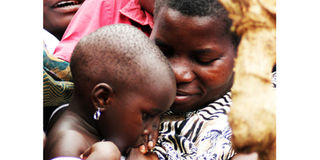Breast feeding lowers HIV risk

A mother in Bombo breast feeds her baby recently. Health experts advise mothers to breast feed their children until they are two years. Photo by Abubaker Lubowa.
What you need to know:
Experts say babies need to be breast-fed for at least six months, with no other liquid.
Exclusively breast-fed babies whose mothers are HIV positive have a lower percentage of contracting HIV from their mothers, compared to those who are not breast-fed for the first six months.
According to experts, the risk of transmission for babies who are breast-fed is 4 per cent, while those who are not is 10 times more.
Dr Phillipa Musoke, an associate professor at the Department of Paediatrics and Child Health at Makerere University, says breast milk does not irritate the gut, digests easily and as such, the lining of the gut remains intact and the virus does not get into the blood stream.
“If you mix feeds, breast feeding and formula or cow milk, they irritate the gut,” she said yesterday during the launch of the 21st breast-feeding week in Kampala.
She, however, says breast feeding alone does not exclusively eliminate the chance of transmission, the reason WHO recommends that the mother continues with anti-retroviral therapy while breast feeding.
This also follows studies which found that giving HIV-positive mothers a combination of antiretrovirals during pregnancy, delivery and breast feeding reduced the risk of HIV transmission to infants by 42 per cent.
The Breast feeding Antiretroviral and Nutrition study in Malawi also showed a risk of transmission reduced to 1.8 per cent for infants given the antiretroviral drug nevirapine daily while breast feeding for six months.
WHO recommends that all mothers, regardless of their HIV status, practice exclusive breast feeding – which means no other liquids or food, are given – in the first six months. After six months, the baby should start on complementary foods.




